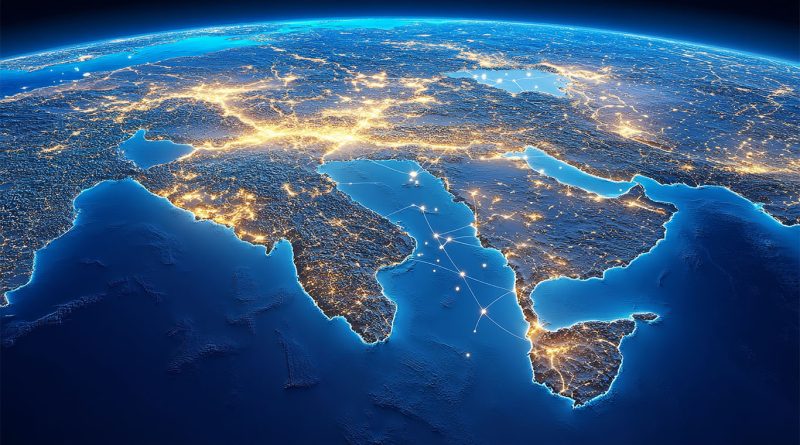US Energy Secretary’s Gulf Visit Signals Major Oil Policy Shift
U.S. Energy Secretary Chris Wright has embarked on a nearly two-week tour of the Middle East, visiting the United Arab Emirates, Saudi Arabia, and Qatar. The trip serves as a high-level precursor to President Trump’s planned visit in May and reflects a broader shift in U.S. energy diplomacy, aimed at strengthening long-term cooperation with Gulf nations.
This mission comes at a time of heightened volatility in global energy markets. With oil prices nearing four-year lows and geopolitical tensions threatening stability, Wright’s visit is intended to secure support from key energy producers and encourage significant financial commitments toward U.S. infrastructure and technology sectors.
One of the primary goals of Wright’s visit is to address imbalances in global oil supply. Sanctions on Iran, Venezuela, and Russia have disrupted the flow of crude oil, contributing to fragile market conditions. Though demand has remained soft, the removal of key suppliers from the global stage has created uncertainty about future availability. Wright is expected to engage with Saudi and Emirati officials to discuss how production levels can be adjusted to support price stability.
Investment, Infrastructure, and Nuclear Diplomacy
While the U.S. is not a member of OPEC, it remains a major influencer in global energy discussions due to its domestic shale production. Wright’s presence in the Gulf signals an intent to steer conversations toward outcomes that avoid oversupply and protect American economic interests. He must also navigate competing priorities. Gulf nations often rely on higher oil revenues to meet national spending goals, whereas U.S. leaders are under pressure to keep fuel prices low for domestic consumers.
Alongside oil diplomacy, the trip places a major focus on investment. The UAE has committed to a 10-year, $1.4 trillion framework for investment in U.S. sectors including artificial intelligence, semiconductors, and manufacturing. This pledge positions the UAE as a key partner in advancing U.S. industrial policy and securing critical technology supply chains. Saudi Arabia, meanwhile, is being encouraged to raise its existing $600 billion commitment to $1 trillion.
These financial pledges are more than political gestures. They represent a strategy of mutual economic reinforcement. Gulf nations gain strategic access to emerging technologies while the U.S. leverages foreign capital to address domestic infrastructure gaps. Wright is expected to meet with investors and regulators to lay out actionable plans for bringing these commitments to life.
The Energy Secretary’s tour also addresses nuclear energy development. In the UAE, Wright will visit the Barakah nuclear power plant, which is the first commercial nuclear facility in the Arab world. Saudi Arabia’s plans to pursue its own nuclear program are also on the table. While the Kingdom seeks to diversify its energy mix, the U.S. remains cautious, insisting that any cooperation be subject to strict non-proliferation agreements.
Under the framework of the “123 Agreement,” the U.S. can only support nuclear energy development in partner nations that agree not to pursue uranium enrichment or plutonium reprocessing. This ensures that civilian programs cannot be repurposed for weapons development. Wright’s task will be to offer technical support while upholding these international standards.
American companies stand to benefit from involvement in Gulf nuclear projects, especially if agreements can be structured to meet both regulatory and commercial needs. The trip is seen as a chance to renew confidence in U.S. oversight while creating market access for American firms.
Regional Strategy and Pipeline Politics
Another item on the agenda is the proposed oil pipeline connecting Saudi Arabia to Israel’s port city of Eilat. The project would allow Gulf oil to be shipped to Europe more efficiently, bypassing the politically sensitive Strait of Hormuz. Though the plan is still in early stages, it illustrates the new realities of regional diplomacy following the normalization of relations between Israel and several Arab states.
For the U.S., this pipeline presents a logistical and strategic advantage. It provides an alternate route for energy exports and reinforces the interconnectedness of formerly adversarial states. Wright is expected to use the opportunity to gauge regional interest in the project and explore how U.S. entities might support its development.
The Energy Secretary’s visit illustrates a broader shift in how the U.S. conducts energy diplomacy. Oil remains central, but the scope has expanded to include clean technology, infrastructure development, and supply chain security. By meeting with key partners, Wright is helping to frame a more integrated and transactional relationship with the Gulf that reflects current global realities.
Sources:
